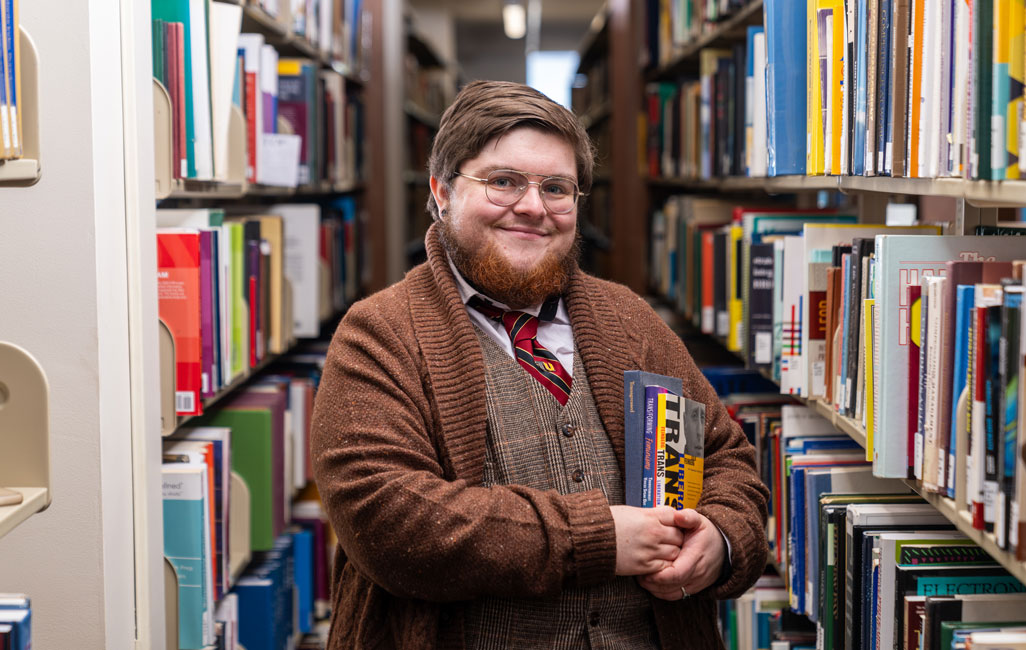Personal experiences inspire TU student's research into intimate partner violence
Senior Samuel Smith supports the trans community at Towson University and beyond
By GRACE HOGGARTH '22 on October 26, 2023

Samuel Smith’s academic experience at Towson University is uniquely characterized by his passion for research and dedication to advocacy for members of the trans community.
President of the Undergraduate Research Club, Smith began his research into intimate partner violence (IPV) and sexual violence within the trans community after his own experience with IPV.
Smith is a double major in psychology and women’s & gender studies with a minor in LGBTQ+ studies— fields of study that have propelled him toward a career path in mental health and advocacy with a focus on intimate partner violence.
In addition to his research, Smith’s time at TU has included substantial involvement in advocacy work through the TU Health Center as a peer-to-peer educator with the Sexual Assault Prevention Education Program (SAPE) and a domestic violence advocate for the Sexual Assault Forensic Exam Unit (SAFE) at the Greater Baltimore Medical Center (GBMC).
Smith is active in the Towson and greater Baltimore communities as the co-chair of LGBTQ+ Educating and Affirming Diversity at St. Matthew Catholic Church, a group that ministers to LGBTQ+ Catholics and their allies. He also previously served as the president of GenderBLUR — a club for transgender, nonbinary, intersex, gender-non-conforming and gender-questioning individuals to talk about their experiences and receive support.
A fifth-year student, Smith used his gap year to heal and educate himself on intimate partner violence within the trans community. “What I found was that while there was not a lot of research on IPV when trans people were victim-survivors, the research we had showed it was incredibly common and the social services, laws and policies we have are not set up to protect trans and nonbinary individuals.”
Smith sought out the Undergraduate Research Club to learn how he could actively pursue this research on an academic and professional level. When he returned and shared the reason he left with his friends, he found out a lot of them had experienced IPV or sexual violence.
“The members of the Undergraduate Research Club were incredibly supportive. I wanted to research, but I had no idea how.” Smith credits former TU psychology professor Paz Galupo, Ph.D., with helping him focus. “We talked about my research interests and decided IPV in the trans community was not only the strongest research line I had but also the one I was the most passionate about.”
His research snowballed into projects with other professors, his work at GBMC and even led him to testify for the Maryland Coalition Against Sexual Assault in front of the Maryland legislature in support of a bill that would change the wording of a state law regarding rape.
“ As a peer-to-peer educator I get to have these one-on-one conversations with students where I can clarify what is healthy in relationships. I’ve found being open about the work I do and my own experiences has led a lot of people to see me as someone to confide in and who can help advocate for them. ”
Smith shares that students, faculty and staff are grateful these resources exist. Many students come to college not knowing what constitutes sexual violence or intimate partner violence.
According to the 2015 U.S. Transgender Survey, more than half (54%) of respondents experienced some form of intimate partner violence, including acts involving coercive control and physical harm.
Often, the broader culture—marginalization, general stress of college, attitudes toward drinking or mental health crises—makes it challenging for young adults to know how to differentiate what is normal and abnormal when it comes to IPV. Even if they know they or a friend are in a violent situation, many don’t know where to turn.
Ultimately, having someone who will listen and understand can be a breakthrough for people and propel them to get the help they need.
Programs on campus like SAPE enable students to support their peers and help connect them with the resources they need to feel supported. "SAPE provides TU students with accurate, helpful, and most importantly, accessible information to prevent sexual violence in our community. SAPE’s educate TU students by facilitating workshops and hosting events on topics such as consent, healthy relationships, and bystander intervention," says Erica Lokshin, assistant director of health education and promotion in the Health Center.
"Peer Educators not only teach their peers about how to prevent sexual violence, but also ways to support survivors of sexual violence through resources on campus such as the Counseling Center and Title IX, community organizations such as TurnAround, which is committed to trauma informed care for all survivors, and digitally, with apps like Circle of 6,” she says.
“ One person isn’t going to change the world. But each person in the world, in Towson, in Baltimore individually making a difference in their own lives and spaces can have a much larger systemic impact. ”
"I have a team at GBMC, at the Health Center, through my research and the groups I’ve been a part of. All of us as a collective can work together towards making a difference even if as an individual it can feel like I’m coming up against a brick wall,” Smith says.
Upon graduating, Smith plans on working in advocacy and data analysis while working toward a doctorate in psychology, so he can be a one-on-one clinician. He plans to continue his advocacy work and activism to further support marginalized individuals.
If you or someone you know is experiencing intimate partner violence or sexual violence, resources are available at TU and within the greater Towson community.
Sexual Violence Resources LGBTQIA+ Support GroupsDIVERSITY AT TU
Celebrating LGBTQIA+ History & Culture
October is LGBTQIA+ History Month. Deepen your understanding about the community, tap into support services and resources, and celebrate a culture of love and acceptance. Learn more.